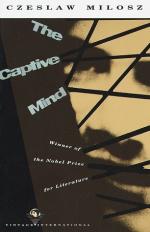
|
| Name: _________________________ | Period: ___________________ |
This test consists of 5 multiple choice questions, 5 short answer questions, and 10 short essay questions.
Multiple Choice Questions
1. What view of Poland's past did Delta's poetry present?
(a) The past provided an alternative to communism.
(b) The past was close to dying out.
(c) The past had the power to save her people from communism.
(d) The past held no hope of peace or rest.
2. In Chapter 8, how does the party treat whatever is not expressed?
(a) It does not exist.
(b) It is not important.
(c) It is not dangerous.
(d) It is most dangerous.
3. After two years, Delta returned again to favor, and how did his future look?
(a) He was given a ten-year contract.
(b) He could not be assured that it will last.
(c) He was returned only for the translation of a Shakespeare poem.
(d) He could be assured that it will last.
4. In Chapter 5, how is Beta characterized?
(a) Shy and aloof.
(b) Shy and arrogant.
(c) Outspoken and arrogant.
(d) Impossible to understand.
5. In light of Beta's poetry, how does Milosz treat the modern artist's potential?
(a) He follows the artistic traditions of former eras.
(b) He works best without established equilibrium.
(c) He is condemned to inactivity.
(d) He can never know rest or inactivity.
Short Answer Questions
1. Why are workers told that it is a crime to strike?
2. In Russia, what organization did Gamma and several of his friends create?
3. Because the Communist Party was at first illegal in Poland, what did party members do?
4. In the people's democracies, according the Chapter 8, what does the most serious battle concern?
5. As Beta relates, when Greek prisoners cannot march because they are too weak, how are they first punished?
Short Essay Questions
1. How does the party's definition of a reactionary reduce him to a comic level?
2. Gamma did not even try to save his family when they were deported to Siberia. How is this a vivid example of the communist attitude toward individual lives?
3. How could Delta, who was not racist, write such violently anti-Semitic material?
4. Why is Gamma called "the slave of history"? Whose interests does he serve?
5. How was Delta's poetry some of the most insightful work being written at the time?
6. How are the peasants, in several ways, the most helpless class of people?
7. How was Delta able to play the game that the center demanded of him--and be better at it?
8. How were Beta and the people of his generation fallen into dark hopelessness?
9. Milosz opens Chapter VI with a description of Vilna as it existed during his childhood. Is this simply to introduce Gamma or is there another reason?
10. Milosz states that the goals of the workers are far different from those of the state. How is this so?
|
This section contains 1,277 words (approx. 5 pages at 300 words per page) |

|




